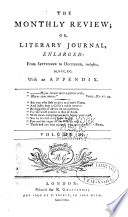 | Ralph Griffiths, George Edward Griffiths - Periodicals - 1790 - 606 pages
...inquiry. ' Tafte,' fays Mr. Alifen, • is that faculty of the human mind, by which we perceive and enjoy, whatever is BEAUTIFUL or SUBLIME in the works of Nature or Art. ' The perception of thefe qualities is attended with an emotion of pleafure, very diftingurfhabie... | |
 | Elizabeth Hamilton - Education - 1802 - 472 pages
...this fenfibility depends upon organization, I cannot prefume to de• termine ; but that it is feldom the boon of uncultivated minds, experience affords...To perceive and to enjoy whatever is beautiful or fublime in the works of nature or of art, is the peculiar privilege of tafte. Its emotions are accordingly... | |
 | Great Britain - 1802 - 764 pages
...all the intellectual powers." /. 307— ЗШ. Our author describes taste as the peculiar privilege to perceive and to enjoy whatever is beautiful or sublime in the works of nature or of :irt ; and in pursuing the subject, observes, that " The more deeply we examine this curious subject,... | |
 | Archibald Alison - Aesthetics - 1812 - 444 pages
...INTRODUCTION. 1 ASTE is in general considered as that faculty of the human mind, by which we perceive and enjoy whatever is BEAUTIFUL or SUBLIME in the works of nature or art. The perception of these qualities is attended with an emotion of pleasure, very distinguishable... | |
 | Archibald Alison - Aesthetics - 1812 - 442 pages
...:» 1 -I ASTE is in general considered as that faculty of the human mind, by which we perceive and enjoy whatever is BEAUTIFUL or SUBLIME in the works of nature or art. The perception of these qualities is attended with an emotion of pleasure, very distinguishable... | |
 | English literature - 1814 - 642 pages
...Taste is used in a figurative sense, to denote that faculty oi'tlic n ind by which we perceive iind enjoy whatever is beautiful or sublime in the works of nature or art. Like the taste of the palate, this faculty relishes some (hin^«, is disgusted with others, and... | |
 | John Mason Good - 1819 - 742 pages
...' TASTE is used in a figurative sense, to denote that faculty of the mind by which we perceive and enjoy whatever is beautiful or sublime in the works of nature or of art. Like the taste of the palate, this faculty relishes some things, is disgusted with other*, and to many... | |
 | Martin MACDERMOT, Martin M'Dermot - Aesthetics - 1823 - 434 pages
...and the elegant arts." Allison defines it: "that faculty of the human mind, by which we perceive and enjoy whatever is beautiful or sublime in the works of nature or art." Reid makes it consist in a power of discerning and relishing these beauties. Voltaire, after... | |
 | Mark Hopkins - Aesthetics - 1841 - 78 pages
...to it. Taste is defined by Alison, to be, " That faculty of the human mind by which we perceive and enjoy whatever is beautiful or sublime in the works of nature or of art." According to this definition, which is sufficiently correct for our present purpose, it will be perceived... | |
 | Mark Hopkins - Congregational churches - 1847 - 524 pages
...to it. Taste is defined by Alison, to be, " That faculty of the human mind by which we perceive and enjoy whatever is beautiful or sublime in the works of nature or of art." According to this definition, which is sufficiently correct for our present purpose, it will be perceived... | |
| |